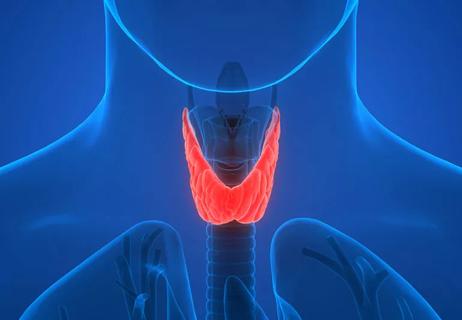Hyperthyroidism can make you feel sluggish and exhausted — but so can other conditions

You’ve probably heard that having an underactive thyroid (hypothyroidism) can make you feel perpetually tired. But what about hyperthyroidism? Can an overactive thyroid lead to fatigue, too? As it turns out, it’s a symptom the two conditions share.
Advertisement
Cleveland Clinic is a non-profit academic medical center. Advertising on our site helps support our mission. We do not endorse non-Cleveland Clinic products or services. Policy
“Fatigue is a well-known and very common symptom of thyroid disease,” confirms endocrinologist Alexandra Mikhael, MD. “Both hypothyroidism and hyperthyroidism can cause fatigue.”
OK, but why? And what does your thyroid even do, anyway? Dr. Mikhael explains the role of this important gland, what can happen if things go amiss and why having an overactive thyroid might lead to fatigue.
Video content: This video is available to watch online.
View video online (https://cdnapisec.kaltura.com/p/2207941/sp/220794100/playManifest/entryId/1_8rsk3meb/flavorId/1_5f3sgelj/format/url/protocol/https/a.mp4)
Feeling unusually fatigued? An overactive thyroid could be to blame. Here’s how it happens.
Your thyroid is a butterfly-shaped gland, located at the base of the front of your neck, that’s responsible for your metabolism, or how your body uses energy.
“Your thyroid helps regulate temperature and keep your organs working properly, including your brain, heart, muscles and others,” Dr. Mikhael explains. “It makes thyroid hormones, which are secreted into your bloodstream and then transported to various organs and tissues throughout your body.”
But sometimes, your thyroid can get out of whack, leading to too much or too little thyroid hormone in your blood.
Because your thyroid sets the pace for your energy levels, having an overactive thyroid ramps up your metabolism — which essentially exhausts your body, leading to fatigue. It can also make it hard for you to get a good night’s sleep, which, of course, only makes things worse.
Advertisement
Everybody knows the feeling of not getting quite enough sleep. Maybe you pulled an all-nighter studying for a big exam or your baby kept you up by crying throughout the night. Whatever the case, you probably woke up the next morning feeling absolutely exhausted.
Fatigue from thyroid dysfunction is kind of like that — but it’s ongoing, and it continues even after you’ve gotten plenty of sleep. It’s the type of brutal exhaustion that interferes with your life and just won’t go away.
“This type of fatigue tends to be prolonged and ongoing,” Dr. Mikhael says. “The exhaustion tends to persist and is more severe than fatigue caused by a lack of sleep or by excessive physical exertion.”
It might also include:
Don’t simply assume that your fatigue is a sign of a thyroid issue. It’s also a symptom of many other medical concerns. And, as Dr. Mikhael points out, fatigue can be multifactorial, meaning that it’s a symptom of having more than one condition at the same time.
Other possible causes of fatigue include:
And that’s just to name a few. “Fatigue is a very vague symptom,” Dr. Mikhael notes.
On the other hand, some people who have a thyroid disorder never experience fatigue — or any other symptoms, for that matter. Many people affected by thyroid disorders may have very mild symptoms or no symptoms at all.
Only a healthcare provider can figure out whether you have a thyroid disorder.
Like fatigue, many of the other common symptoms of a thyroid disorder are also symptoms of a number of other health issues of other issues. Those symptoms may include:
If you’re experiencing fatigue (with or without other symptoms), it’s important to see a healthcare provider. “They will determine if your fatigue is related to your thyroid gland by taking a thorough history, detailing specific symptoms, obtaining a medical history and performing a physical exam,” Dr. Mikhael states.
They may decide that you need additional testing, like a blood sample that looks for high levels of thyroid hormone, or an ultrasound that shows your thyroid on a computer screen for better viewing.
Advertisement
If your provider discovers that you do, in fact, have an overactive thyroid, they’ll decide which treatment is best for you — like, for example, medication that blocks your thyroid from overproducing thyroid hormone.
Good news: Treating your thyroid disorder should improve your feelings of fatigue. If not, Dr. Mikhael says it’s time to look at other possibilities: “If your fatigue persists after normalization of thyroid tests, your healthcare provider should help investigate other potential causes.”
Advertisement
Learn more about our editorial process.
Advertisement

Hypothyroidism is underactivity of your thyroid gland, while hyperthyroidism is overactivity — but both conditions need treatment

No diet can cure hypothyroidism or hyperthyroidism, but some foods and supplements can cause trouble

Foods high in selenium, like Brazil nuts, cottage cheese and some fish, can help support healthy thyroid function

Only take supplements recommended by your healthcare provider — others can worsen your condition

Typical signs include growth delays and low energy

The truth about natural thyroid symptom relief

How overtreatment for hypothyroidism places you at risk

Wearing a scarf, adjusting your outdoor activities and following your asthma treatment plan can help limit breathing problems

Your diet in the weeks, days and hours ahead of your race can power you to the finish line

When someone guilt trips you, they’re using emotionally manipulative behavior to try to get you to act a certain way